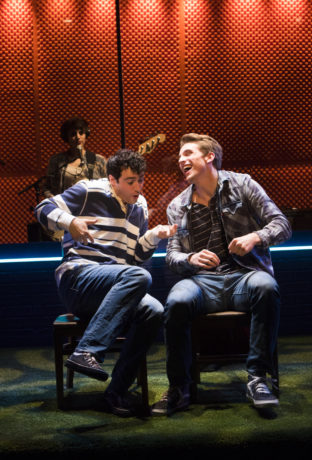The rock musical Girlfriend celebrates the tentativeness and exuberance of a budding romance between two gay teens in a small town Nebraska in the 1990s. Just after graduating from high school, Will, a socially awkward loner (Jimmy Mavrikes), and Mike, a popular jock (Lukas James Miller), gradually come to terms with their mutual attraction. As tenderly directed by Matthew Gardiner on Signature’s intimate ARK stage—and as exquisitely performed by Mavrikes and Miller—Girlfriend is a sublimely touching love story that aches with emotional authenticity in each instant.

Todd Almond wrote the semiautobiographical book around lyrics and music borrowed from Matthew Sweet’s hit 1991 alternative rock album titled Girlfriend. There’s a disarming irony in the fact that Sweet wrote and recorded Girlfriend after his divorce from his wife, yet Almond uses these songs to express the feelings flooding between two young men. For instance, during a scene where Will and Mike are at a drive-in watching a movie, they sing
I didn’t know nobody
And then I saw you coming my way
Don’t you need to get in the arms of a good friend?
Oh, cuz believe me, I’d sure love to call you my girlfriend.
Earlier Mike had given Will a mixtape of songs from Sweet’s album, which they’re both really into. Now they’re singing from it together ostensibly as fans. In fact, they’re singing the song to each other, warily coming out to each other and themselves. Sweet’s lyrics are therefore a little off-kilter, not your typically explicit burst-out-in-song-to-share-a-feeling musical number. Yet here as throughout the show, Sweet’s lyrics function to speak truths that dare not otherwise be said.

In relying on lyrics that were written as male to female and repurposing them as male to male, Almond risks echoing the campy custom of gay men appropriating female references for each other. But Girlfriend steers clear of that slang in two critical ways. First, the script situates Mike and Will completely outside the gay culture of the period. And second, it gives Mike and Will not a smidgen of the gendering misogyny that can accompany gay men’s mock feminizing of one another. Thus in Mavrikes’s and Miller’s extraordinarily soulful and ebullient performances, we are at liberty to be ever affected by their characters’ purely heartfelt affection.
Also underscoring Girlfriend‘s gender-just politics while rocking the house are the four women in the band—Musical Director Britt Bonney (keyboard), Beth Cannon (guitar), Nicole Saphos (bass), and Erika Johnson (drums). Scenic Designer Misha Kachman has cleverly positioned them upstage as if in a recording studio, such that when they sing and play backup they become literally the generational soundtrack to Will and Mike’s romantic exploration.

With light-show colors, Lighting Designer Colin K. Bills shifts our focus artfully between the characters and the musicians. Costume Designer Frank Labovitz gives the musicians a hip rocker look and the high school grads a closetful of apt shirt changes. And Sound Designer Ryan Hickey not only vividly sets scenes, as with a passing train or that drive-in movie; he mixes in the actors’ subtly mic’ed voices such that those who know Sweet’s eminently singable melodies might want to sing along.
The slur “faggots” occurs once, the prerecorded sound of teen boys driving by and reviling them. It is a rupture, an intrusion of the real world, and thereafter Will’s and Mike’s love story is tested. But by then we are rooting for them, we want them to stay together, not least because the onstage chemistry between Mavrikes and Miller is riveting.
When they dance with each other to the music, it is as if their unspoken courtship gets physical. But more often they are facing the audience and reacting as if facing each other. Are they looking into some invisible mirror to know so minutely what the other is feeling and thinking, even in pauses between lines? How do they manage to fill each silence such that we hold our breath for what a look or glance will reveal next? And when they are not belting out songs but simply speaking softly very up close, how do they conspire to so transfix us as moment by moment they let us in on what is going on in their respective hearts?
In this era of rising anti-LGBTQ animus sanctioned by our Wannabe Alpha Male in Chief, Girlfriend‘s celebration of misogyny-free male-male love makes this production an artistic triumph.
Running Time: 90 minutes, with no intermission.
Girlfriend has been extended through June 17, 2018, at Signature Theatre – 4200 Campbell Avenue, in Arlington, VA. For tickets, call (703) 820-9771, or purchase them online.





